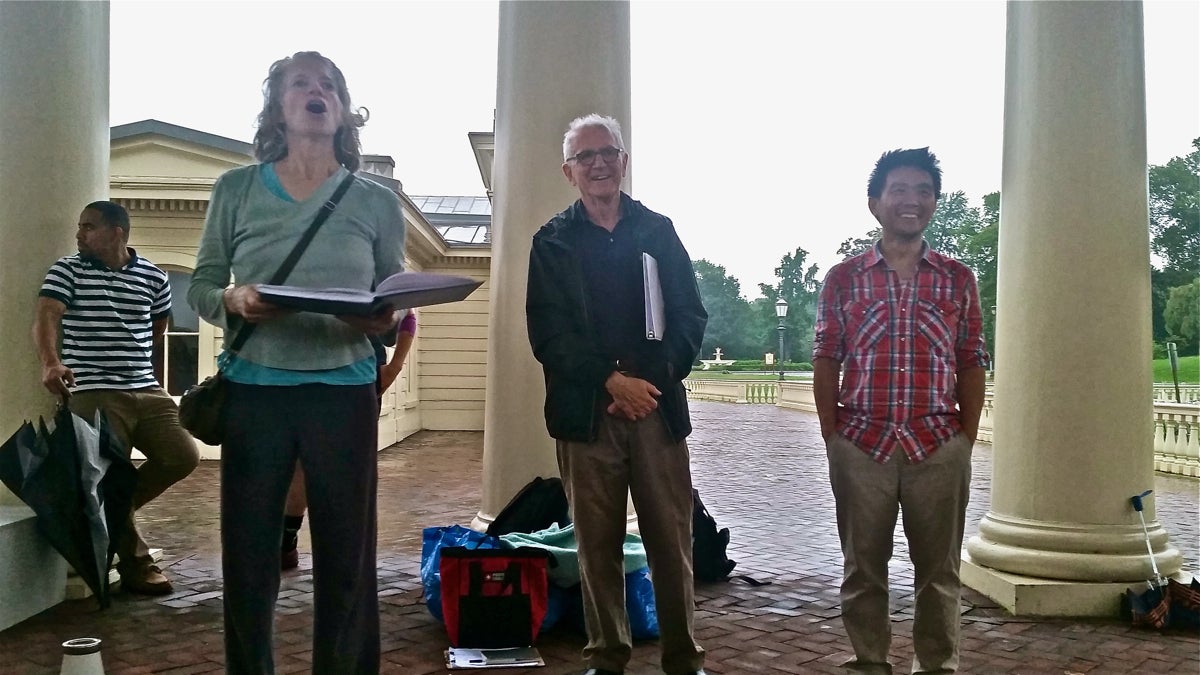One of a kind performance at the Waterworks
Listen
Mendelssohn Club Musical Director Alan Harler (center) attends rehearsal for his final production, TURBINE, at the Philadelphia Waterworks. He is joined by choreographer Leah Stein and composer Byron Au Yong. (Peter Crimmins/WHYY)
Rain is forecast this weekend, but that won’t stop Philadelphia’s Mendelssohn Club from going outside to perform its world premiere of TURBINE, a site-specific composition written to be sung at the Fairmount Waterworks, on the banks of the Schuylkill River.
The piece was commissioned by Alan Harler, music director of the Mendelssohn Club, and choreographer Leah Stein to mark the 200th anniversary of American’s first municipal water system.
“I chose texts that related to the Waterworks,” said composer Byron Au Yong, of Seattle. “Nineteenth-century texts of travelers like Caroline Gilman, Charles Dickens, and folks who visited the Waterworks when it was one of the top tourists destinations in the world.”
For the performance, 60 choral singers, 15 dancers, and 300 audience members will roam across an acre of property stretching from Boathouse Row to the Grand Plaza of the Waterworks.
“It’s an experiment,” said Stein. “It’s the audience – they are a really key piece in this work. They’re not just coming to see something. They are so integrated. We’re asking a lot. It’s not quite participatory, but almost.”
The audience will be moving alongside the singers. For much of the concert, no one listener will be able to hear the entire chorus, only the parts to which he happens to be standing nearest.
The music was written with that in mind. In many sections, each singer is instructed to decide for himself when to transition between certain sounds. The text of the music is comprised of just key words culled from those 19th century texts, not coherent phrases. The end result is a sound that is somewhat random and fluid.
“That informs my work – metaphors of water,” said Au Yong. “Not the text, but what sound can do, what movement can do if you move around people.”
TURBINE is the most ambitious staging the Mendelssohn Club has attempted, and the only concert they have ever given outdoors.
It’s also the final performance of Alan Harler, who will retire as music director after 27 years.
After a traditional but equally ambitious performance last February of Mendelssohn’s historic 1829 version of Bach’s “St. Matthew’s Passion” (with a related scholarly symposium), Harler wanted to go out with something completely different.
“I wavered for a moment when planning the season,” said Harler. “[thinking] I should really do another Brahm’s Requiem. I love it so much, and I’m not going to have another chance. Then I came to my senses. This is a great opportunity for me.”
Rain or shine, the chorus and dancers will perform TURBINE. In the likely event of the former, ponchos will be distributed to intrepid audience members.
“It feels perfect,” said Harler, wearing a hooded jacket to rehearse the singers onsite during a rainstorm. “Our mission is to do the standard master works and new experimental American music. That’s my mission. It makes sense for me.”
WHYY is your source for fact-based, in-depth journalism and information. As a nonprofit organization, we rely on financial support from readers like you. Please give today.





